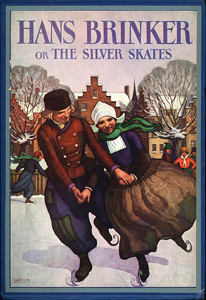Different Drums: Border Crossing
The Horn Book Magazine asked Mitali Perkins, “What’s the strangest children’s book you’ve ever enjoyed?”
At first glance, there’s absolutely no compelling reason why a young immigrant from India would choose Hans Brinker, or, The Silver Skates: A Story of Life in Holland by Mary Mapes Dodge as a favorite read.
 The Horn Book Magazine asked Mitali Perkins, “What’s the strangest children’s book you’ve ever enjoyed?”
The Horn Book Magazine asked Mitali Perkins, “What’s the strangest children’s book you’ve ever enjoyed?”At first glance, there’s absolutely no compelling reason why a young immigrant from India would choose Hans Brinker, or, The Silver Skates: A Story of Life in Holland by Mary Mapes Dodge as a favorite read.
And yet I did.
Writing in 1865, Dodge made blunders we still see today when authors attempt to cross borders: 1) She was overly reverential about the Dutch, portraying them as collectively hardworking, thrifty, patriotic, and sacrificial. 2) She introduced an otherwise fairly useless foreign character (Ben Dobbs) through whose eyes equally foreign readers were supposed to see this “exotic” culture. 3) She relied exclusively on secondhand sources (John L. Motley’s The Rise of the Dutch Republic and The History of the United Netherlands and conversations with one family of immigrant Dutch neighbors in the United States), never visiting the Netherlands until after the novel was published. 4) Thanks to these sources, half the book reads like a sightseeing guide, with museums, art, and history described in excruciating detail that threatens to choke the flow of the story.
And yet it doesn’t.
I loved the book and still do. Dodge wove together three storytelling strands: a compelling Rip Van Winkle–esque mysterious plot in which two family’s lives are intertwined; teen characters whose voices still ring true thanks to Dodge’s mastery of humor and understanding of young romance and friendship; a sense of place so strong I feel ice gliding under a pair of imaginary skates from the first page.
Plot, place, people: braid the three well and you’ve got a timeless story. I’m loaning the book to a Dutch friend to see if inauthenticity makes this novel completely unreadable for her, because my joy in the story is a bit unsettling: if the storytelling is good, are cultural blunders more forgivable or more dangerous?
From the March/April 2013 special issue of The Horn Book Magazine.

RELATED
RECOMMENDED
ALREADY A SUBSCRIBER? LOG IN
We are currently offering this content for free. Sign up now to activate your personal profile, where you can save articles for future viewing.






Add Comment :-
Comment Policy:
Comment should not be empty !!!
Junko Yokota
You raise a very compelling question, Mitali. It's interesting to me that I read your piece back to back with a review of Madame Butterfly. I'm an opera fan, and many operas are filled with stereotypes, misinformed images of culture and outdated perceptions of people. Yet because of the beauty of the music, they continue to be performed and celebrated. When the culture that is being depicted wrongfully is not my own, I grimace at the costumes, setting, and roles being played out in front of me. Yet when the curtain call comes, if the orchestral music and singing have been overwhelmingly good, I find myself applauding despite my reaction to cultural elements. When the music has been mediocre, I have walked out at intermission and not returned for the last act. So how does my assessment of particular elements impact my appreciation for the whole? I find myself dismissing particulars (yes, even the role of women in many operas) as, "it's just opera." Despite the fact that I have seen countless operas, I have carefully avoided Madame Butterfly. Why? Because I don't want to experience the shame and betrayal one feels when one's own culture is portrayed embarrassingly. Can I overlook those aspects to enjoy the musical whole? Must I sit through the parts that make me wish I could be invisible and hope nobody in the audience realizes that I'm from that culture that is being depicted on stage in the way that it is? An important consideration: when one is culturally among the noticeably few in the audience group, the feelings of alienation are amplified. When one is in the majority, there is more comfort in feeling camaraderie with others around you.Posted : Nov 10, 2015 03:06
Debbie Reese
If the storytelling is excellent, I think the cultural blunders are dangerous when the blunders reinforce or introduce ignorance about that culture, especially when the culture is one that has been, and continues to be, oppressed by the power structure of the culture who celebrates the storytelling in that book.Posted : Mar 24, 2013 11:29